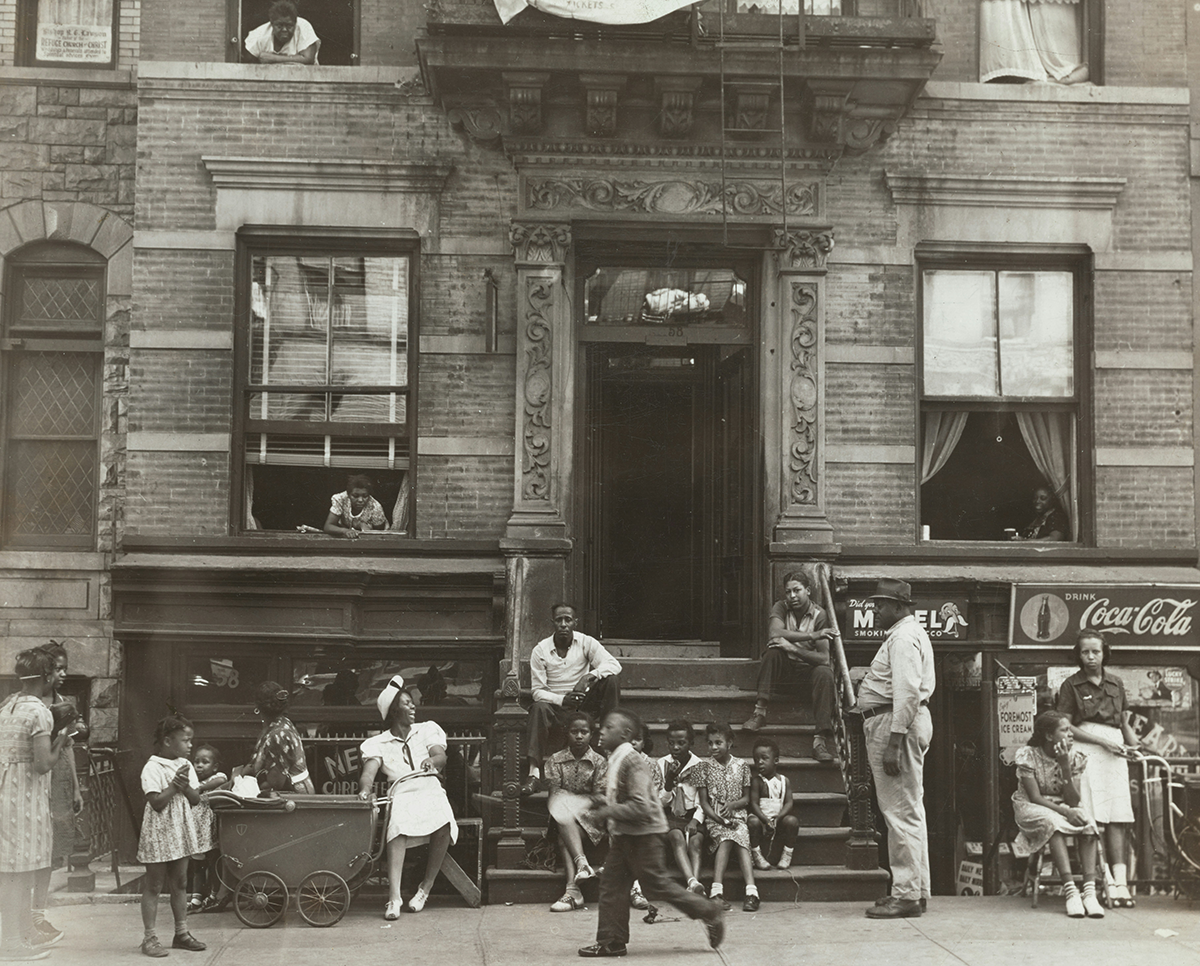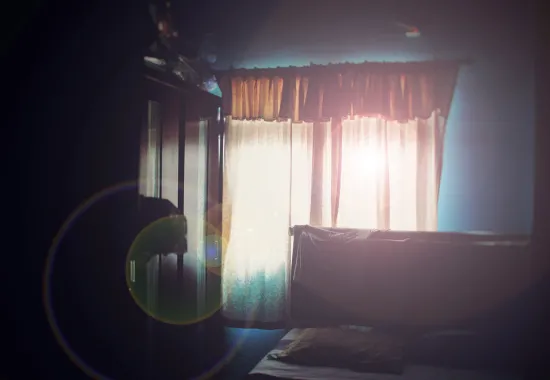Song in Harlem’s Promised Land
Grandpa’s Harlem began at Stebbins Tool & Die factory, six blocks from the Apollo Theater, in 1946, the year he learned the fate of his family back in Poland. My Harlem began in elementary school 25 years later, the day I met a boy my age named J.T. who lived in a brownstone just down the street from the Apollo.
I knew my extended relatives only in a blurred sepia photograph on my parents’ mantelpiece. A dozen nameless family members, smiling or severe. My great grandmother’s spectacled face. My great grandfather’s thick brush of white beard, black yarmulke, hands gripping his knees, a man who belonged to another century. A boy my age in knickers held a soccer ball on his lap. How was he related to me? What happened to that ball? I knew everyone there except Grandpa and Grandma had been killed.
Faivel Korabelnik (soon Americanized to Philip Korabel) arrived at Ellis Island in 1933, clutching the American promise that he’d secure his family’s passage once he’d saved enough. By 1939 he was quickly saving money working in a factory the government commissioned to make the fighter planes it never used to bomb the death camps.
On the day thirty-two years later that Grandpa guided me around the shop at E 124th St. and Lexington Ave, he held my hand. He was a short, stocky man, with a bald dome, oval face and soft, almond-eyed gaze. He explained the screeching lathe, the rumbling surface grinder, the thumping power press as I studied the two Jewish war survivors wearing goggles who toiled in the light slanting through the fifth-story windows.
Earlier that morning in his Bronx apartment overlooking the Jerome Park Reservoir, Grandpa had placed his rough hand over my smooth hand and tapped like he was transmitting code, repeating the mysterious chant from our Passover story I’d yet to recognize. Day-day-enu. Day-day-enu, he sang, somber and gentle, recounting how God plagued the Egyptians to deliver us to the Promised Land. But Grandpa, so spare of words, did not speak of deliverance, of slavery, enormity, miracles or freedom. He only sang and looked into my eyes. This was, I think, a survivor’s silence to protect a grandson, liberation being too fragile, and joy, a perilous risk. Better not to declare these openly. Instead, pass them through the safety of a song.
So, I just thought Grandpa had made up this warm singsong to tell me I was special, special the way I felt when he danced in a circle while I stood on his shiny black shoes scented by polish, and when he rubbed his cheek rough against mine, though I’d watched him shave in a white t-shirt that morning. Grandpa so close, yet so far away, the foreign block letters on his newspaper, the strange Yiddish accent and the words he reversed. “You are getting good school marks, yes?”
We were Jewish, not Black like J.T. but maybe poor in another way.
I wish now to walk beside Grandpa on a late Friday night after he locks the factory door and steps into the brisk December air protected in a black wool overcoat. Before sunset it rained and the sidewalk shines below the Lexington Ave streetlight as he turns right onto 125th toward the subway. Does he know that inside Mount Olivet Baptist Church nearby at 120th St and Lenox Avenue where a minister preaches on Sundays, a rabbi had once chanted the Torah, that synagogues all across Harlem had converted to Black churches after the Jews moved out in the 1920s and the African Americans of the Great Migration moved in? Does he know, approaching the Apollo, that a jazz diva is shining onstage tonight—Ella Fitzgerald maybe, liquid and glass, or Sarah Vaughan, breathy and firm. Or the inimitable Billie, baring her soul, vibrating between desire and grief?
Billie keens a cousin song of his own grief. “Strange fruit hanging from the poplar trees.” Pogroms and ghettoes undressed. “Then the sudden smell of burning flesh.” Ovens and ash. A nightmare without faces. For the promise of this city to which they escaped, both reinvented their names to convert wounds into the fruits of lips and hands.
A light rain begins. Grandpa reaches the throng below the luminescent marquee, fashionable Black people, some white, men standing tall wearing snug leather gloves, women in feathered hats and shined heels. He’s struck by a quaver in the air. Yiddish turns to English. How she can sing so brave but fragile? A pulse down in his throat. Jazz music, he thinks. A trumpet? (He doesn’t know the saxophone). Jewish people also play, clarinet. George Gershwin, blue. The poster reads, “Billie Holiday: One Week Only.” Black woman, but light skin, bare shoulder, sad smile, white flower to kiss the cheek. Yes, at home on the radio I can hear.
Down the street in my Harlem, I knew J.T. the day I entered his world in the school library. I almost was J.T, a boy alone who knew how to care for himself. In one black and white photo, J.T. scans the street from the stoop, black leather hat atop his Afro. J.T. in bed, cold December, a radio soft under his hat flaps. One day in an alleyway, he finds a scrawny, one-eyed cat covered with scratches and bruises. He builds the cat a house from an abandoned stove and demolition scraps, names him Bones, soothes him with his radio, wraps him in his coat hood to ease the chill, sews an eyepatch. My body felt the deeper meaning of the cat’s wounds and J.T.’s devotion to healing them that touched my own buried hurts. But two bullies taunt J.T. for his tenderness, teasing the cat, who falls, darts into the street and is killed by a car. Alone in the gray library corner, my thumbs gripping the pages, I cried into the silence. “But why did he have to die?”
After Grandpa had showed me the factory, we climbed into his Buick toward the skyscrapers, turning onto 125th then left down 5th Ave into J.T’s world. July’s hot breath against my cheek through the window, children in cut-offs and t-shirts running around hydrants spouting water arcs, J.T. almost there with me. Girls in pigtails and big Afros skipping rope. “Harlem,” skip, skip, “Harlem.” Singing about Harlem, but no—to Harlem, alive, watching over and pleased with their rhythm. But Harlem hurt. Boarded windows, blackness inside, awnings heavy, hot thickness of children everywhere like poverty.
Grandpa’s hand silent on mine, the questions inside me also silent, as I watched the slow cinema unfold. 102nd, 96th, 81st, 65th. Script addresses, white tablecloths, skinny blonde mannequins posing rich and stuck up behind the glass. I understood this ride was America, J.T. abandoned now. And Grandpa? He wasn’t rich, but he owned the tool and die shop. Yet he spoke bad English and was alone in Harlem and he didn’t and never could know J.T. alive in the street. No, Grandpa was not poor, but his relatives were murdered. We were Jewish, not Black like J.T. but maybe poor in another way.
I understood then I had a promise to seek. Maybe a song would help. Balm for grief, almost a blessing. I will belong.
“Song in Harlem’s Promised Land” is adapted from the book-in-progress Jewfro American: An Interracial Memoir.
Recommended
I Have Only Dreamed You Dead, For Now.
Encounter
Schizophrenic Sedona






